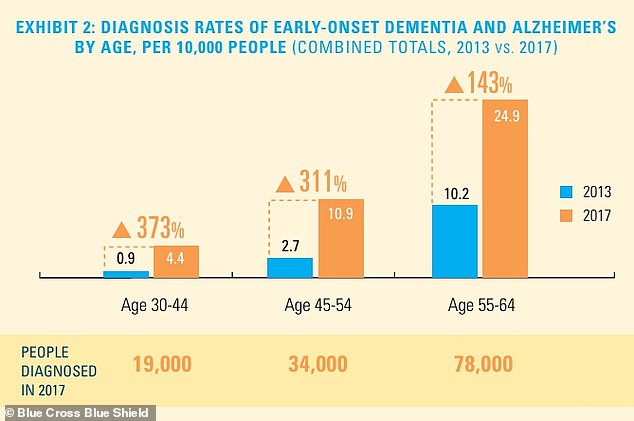Listening to the radio or playing your favorite songs while you cook may bolster your memory and reduce your risk of dementia later in life, new research reveals.
A team of scientists from Rice University in Texas and the University of California, Los Angeles, tested college students’ memories by having them complete tasks while they weren’t listening to music and then again when they were.
People with a stronger emotional response to the music they heard showed a better ability to remember the images of everyday activities they were quizzed on.
The team built upon years of research that examined the power of music for memory, but added that the mechanism for remembering is how emotional people become while listening to the music.
Their findings could have a wide-reaching impact, offering hope for the 8.6 million Americans with dementia, more than 7 million of whom have Alzheimer’s.
Dr Sanam Hafeez, a neuropsychologist, told the Daily Mail music can be part of an effective tool in reducing the risk and possibly slowing the progression of dementia.
‘Music helps tap into memories and emotions that might otherwise feel out of reach,’ she said. ‘Over time, that kind of stimulation might delay how quickly symptoms progress.’
Researchers believe that a ‘moderate’ emotional response bolsters the connection between parts of the brain, improving people’s memories. But too big or too small a response showed signs of weakening these connections.

An emotional response to music manipulated to elicit different moods helped people remember images of people doing everyday activities that they were shown before the songs played (stock image)
The more emotionally affected the 130 college students felt while listening to carefully selected music, the better they remembered images they had seen beforehand.
‘Music activates the brain’s limbic system, which processes both memory and emotion,’ Dr Kimberly Idoko, neurologist and medical director at Everwell Neuro, told the Daily Mail.
‘The more emotionally activated someone is, the more the brain flags that moment as worth storing. That’s why emotionally charged music can boost recall of big-picture experiences.’
Researchers played music gathered for the study by searching emotional keywords like ‘sad,’ ‘happy’ and ‘calming’ on YouTube.
They chose three songs per category, designed to trigger emotions after having a separate group rate them for pleasantness, familiarity and mood.
Participants then completed a memory task sorting 128 everyday objects as ‘indoor’ or ‘outdoor’ – a subtle way to test recall.
After a 30-minute break, participants repeated the memory task with 192 images – some old, some new – to measure both general and detailed recall.
Next, they listened to music, neutral sounds (like crackling fire) or silence for 10 minutes while filling out mood and wellness questionnaires, followed by 20 minutes of quiet.

While the total number of people diagnosed is relatively small, the diagnosis rate of early-onset dementia and Alzheimer’s disease is increasing, especially in younger age groups
Then, they completed the memory task again, sorting images as old or new.
Music successfully prompted an emotional response at differing levels.
Researchers sorted participants into minor, moderate or significant emotional responses after the listening session.
People with a moderate emotional response to the music performed better on the last memory test.
In contrast, people with either very low or very high emotional responses had poorer memory performance.
‘The more emotionally activated someone is, the more the brain flags that moment as worth storing,’ Dr Idoko said.
‘That’s why emotionally charged music can boost recall of big-picture experiences. And why, when an emotional response is more moderate, the brain has more bandwidth to encode the details.’
While the study compared memory in college students, its findings could benefit Americans over 65 who are more likely to experience dementia.

Projected yearly incidence of dementia on the basis of current rates (solid lines) and projected incidence of dementia assuming continuation of a decreasing trend (dashed lines)

Every state except one has seen a surge in Alzheimer’s fatalities between 1999 and 2021, data from the Centers for Disease Control and Prevention ( CDC ) shows
Their research was published in the Journal of Neuroscience.
Older adults who have not been diagnosed with dementia might still begin to exhibit signs of mild cognitive impairment.
Roughly 12.2 million Americans are living with mild cognitive impairment – a possible stepping stone to Alzheimer’s that involves memory lapses and mental slowdowns noticeable to the person and those around them, but not severe enough to disrupt daily routines.
Your browser does not support iframes.
The brain is particularly adept at storing memories of events or phases of one’s life where music played a prominent role, improving their ability to recall memories of those events when that music plays.
But it doesn’t have to be music they know. Past research has shown that patients can recall personal memories in greater detail even when they listen to unfamiliar music.
Yelena Sokolsky, a home health nurse and founder of Galaxy Homecare, told the Daily Mail that music therapy is especially valuable for people with early dementia.
‘As cognitive functioning declines, individuals may struggle with verbal communication – this can lead to feelings of heightened confusion, fear or agitation.
‘However, music can evoke emotion and memories, bringing comfort even when other forms of communication become challenging.’